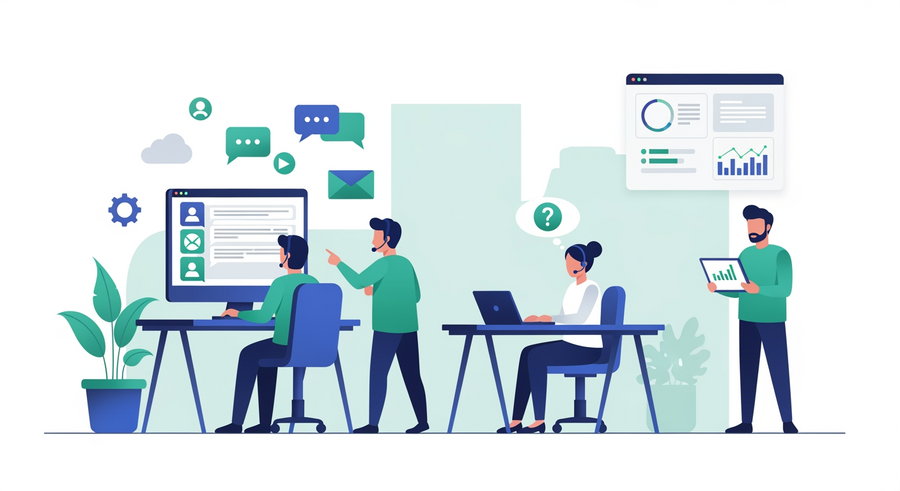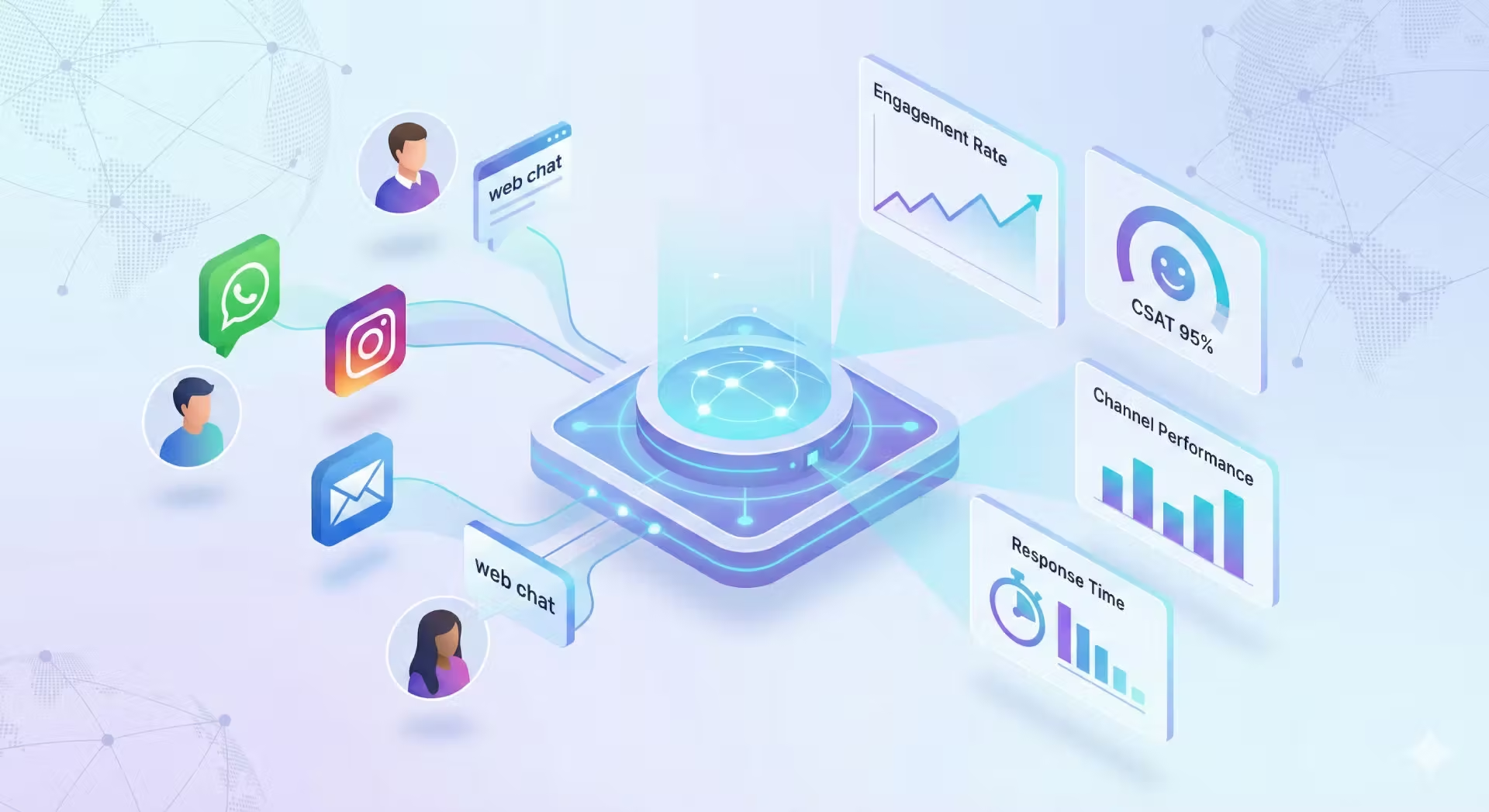In today's rapidly evolving business landscape, companies are constantly seeking ways to streamline processes, reduce costs, and improve efficiency. As we navigate through 2024, one question that has been on the minds of many business leaders is, "What is AI automation, and how can it revolutionise our operations?
AI automation has emerged as a game-changing technology, offering businesses the opportunity to automate repetitive tasks, make data-driven decisions, and unlock new levels of productivity. In this blog post, we'll explore the concept of AI automation, its benefits, and how it can be applied across various industries to drive innovation and growth.
At Trengo, we've worked closely with companies to implement AI solutions for over a decade, witnessing firsthand the transformative power of this technology. Whether you're a small business owner or a corporate executive, understanding AI automation is crucial to staying competitive in the digital age. So, let's dive in and discover how AI automation can help your business thrive in 2024 and beyond.
What is AI automation? Transforming customer service
AI automation combines artificial intelligence technologies with automated processes to streamline business operations, particularly in customer service. This innovative approach uses machine learning algorithms, natural language processing (NLP), and advanced data analysis to automate routine tasks and provide intelligent, personalised assistance to customers.
In customer service, AI automation goes beyond simple rule-based systems. It can understand customer intent, analyse sentiment, and learn from past interactions to continuously improve its performance. For instance, AI-powered chatbots can engage in natural conversations, answer queries, and even process transactions without human intervention.
The key advantage of AI automation in customer service is its ability to handle large volumes of interactions simultaneously, 24/7. This capability significantly reduces wait times and improves customer satisfaction. By processing vast amounts of data and building sophisticated AI models, these systems make intelligent decisions and provide accurate, timely support, revolutionising the customer service landscape.
Is AI the same as automation? Unravelling the distinction
While AI and automation are often mentioned in the same breath, they are distinct concepts with unique characteristics. AI refers to systems that can learn, adapt, and make decisions, while automation focuses on executing predefined tasks without variation.
Traditional automation operates on set rules and procedures, designed by engineers to perform specific, repetitive tasks efficiently. These systems don't 'think' or 'learn' but rather follow a predetermined set of instructions meticulously. For instance, an automated email response system sends out pre-written replies based on specific triggers, without any real understanding of the content.
AI, on the other hand, brings a level of intelligence and adaptability to automation. AI-powered systems can analyse data, recognise patterns, and make decisions based on their learning. They can adapt to new situations and improve their performance over time without explicit reprogramming. An AI-driven customer service chatbot, for example, can understand context, learn from interactions, and provide more nuanced responses than a traditional automated system.
In essence, while all AI can be considered a form of automation, not all automation involves AI. AI represents a more advanced, flexible, and intelligent approach to task execution, capable of handling complex, dynamic situations that traditional automation cannot.
How AI and automation work together in customer service
In the realm of customer service, the synergy between artificial intelligence (AI) and automation is transforming the way businesses interact with their customers. By combining the power of these two technologies, companies can streamline processes, enhance efficiency, and deliver exceptional customer experiences.
One prime example of AI and automation working together in customer service is the use of intelligent chatbots. These AI-powered virtual assistants can handle a wide range of customer inquiries, providing instant support 24/7. By leveraging natural language processing (NLP) and machine learning algorithms, chatbots can understand customer intent, analyze sentiment, and provide accurate, personalized responses.
Consider a scenario where a customer reaches out to a company's support team with a query about their order status. An AI-powered chatbot can instantly access the customer's order details, track the shipment, and provide real-time updates. If the customer has a more complex issue that requires human intervention, the chatbot can seamlessly transfer the conversation to a live agent, along with a summary of the interaction and relevant customer data.
This seamless integration of AI and automation ensures that customers receive prompt assistance while allowing human agents to focus on more intricate, high-value tasks. By automating routine inquiries and providing intelligent support, businesses can significantly reduce response times, increase customer satisfaction, and optimize their support operations.
How can you automate more with AI?
As AI technology continues to advance, businesses have the opportunity to automate even more aspects of their customer service operations. Here are a few ways you can leverage AI to take your automation efforts to the next level:
1. Intelligent Routing: AI can analyze customer data, interaction history, and agent skills to route inquiries to the most suitable agent or department. This ensures that customers receive the best possible support based on their specific needs, leading to faster resolution times and improved customer satisfaction.
2. Sentiment Analysis: By using AI to analyze customer sentiment across various touchpoints, such as social media, email, and chat, businesses can proactively identify and address potential issues before they escalate. This proactive approach helps maintain positive customer relationships and prevents minor concerns from turning into major problems.
3. Personalized Recommendations: AI can analyze customer data, purchase history, and browsing behavior to provide personalized product or service recommendations. By offering tailored suggestions, businesses can enhance the customer experience, increase cross-selling opportunities, and boost customer loyalty.
4. Predictive Analytics: By leveraging AI-powered predictive analytics, businesses can anticipate customer needs, identify trends, and optimize resource allocation. This enables companies to stay ahead of the curve, proactively address potential issues, and deliver exceptional customer service at scale.
The benefits of AI automation in customer service
As businesses strive to stay competitive, AI automation has emerged as a game-changer in customer service. Let's explore the key benefits:
Boosting team productivity
AI-powered automation acts as a force multiplier for customer service teams. It handles routine inquiries, freeing up human agents to focus on complex, high-value interactions. This synergy leads to faster resolution times and improved overall productivity.
Enhancing the customer experience
AI automation delivers quick, accurate, and personalized service. It provides 24/7 support through chatbots, offers personalized recommendations, and ensures consistent information across all touchpoints, creating seamless experiences that foster customer loyalty.
Scaling operations efficiently
AI allows companies to handle increased volumes of customer interactions without compromising quality. It adapts to peak periods and integrates with existing systems, ensuring businesses maintain high standards of customer service as they grow.
Reducing costs and optimizing resources
By minimizing human intervention in routine tasks, reducing errors, and optimizing resource allocation, AI automation significantly cuts operational costs. These savings can be reinvested to further enhance the customer experience.
Accelerating digital transformation
Implementing AI automation often catalyzes broader digital transformation. It encourages businesses to rethink processes, adopt data-driven decision-making, and foster a culture of innovation, positioning them at the forefront of technological advancement.
Use of AI automation across different industries
AI automation is revolutionizing various sectors, enhancing efficiency, accuracy, and innovation. Let's explore how different industries are leveraging AI automation to transform their operations and services.
Health care
In the healthcare sector, AI automation is making significant strides in improving patient care and medical research:
- Disease Detection: AI algorithms developed by companies like Zebra and Google DeepMind can analyze patient data with high accuracy, detecting abnormalities and potential diseases early.
- Remote Patient Monitoring: Tools like Biofourmis enable doctors to monitor patients remotely, collecting real-time data and gaining insights into potential health issues.
- Robotic Surgery Assistance: AI-powered robotic tools assist surgeons in performing precise actions during procedures, reducing the risk of errors.
- Drug Discovery: AI models can simulate drug interactions, accelerating the discovery of breakthrough treatments and potentially revolutionizing pharmaceutical research.
Finance
The finance industry is harnessing AI automation to enhance decision-making and security:
- Risk Assessment: AI tools can quickly analyze a potential borrower's financial history, streamlining the underwriting process and improving risk evaluation.
- Fraud Prevention: By learning from previous financial transactions, AI can detect abnormal behavior indicative of fraudulent activity, helping to combat the rising tide of financial scams.
- Algorithmic Trading: AI-powered systems can analyze market trends and execute trades at optimal times, potentially increasing returns for investors.
Manufacturing
AI automation is transforming manufacturing processes, optimizing operations and maintenance:
- Supply Chain Optimization: AI can analyze historical data to forecast future demand, helping businesses manage their supply chains and inventory levels more effectively.
- Predictive Maintenance: AI tools monitor equipment performance, predicting when maintenance is needed and reducing downtime.
- Quality Control: Machine learning algorithms can detect defects in products with higher accuracy than human inspectors, improving overall product quality.
Retail
In the retail sector, AI automation is enhancing customer experiences and operational efficiency:
- Inventory Management: AI applications like Addepto analyze sales data to predict future demand, helping retailers optimize their inventory levels.
- Dynamic Pricing: Similar to rideshare applications, retailers can use AI to adjust prices based on demand, maximizing revenue and competitiveness.
- Personalized Recommendations: AI algorithms analyze customer behavior to provide tailored product recommendations, enhancing the shopping experience.
Marketing & advertising
AI automation is revolutionizing how marketers create and target campaigns:
- Content Creation: Generative AI tools can produce personalized marketing content, from email subject lines to ad copy, based on brand guidelines and customer data.
- Audience Targeting: AI analyzes vast amounts of consumer data to identify the most receptive audience segments for specific campaigns.
- Campaign Optimization: Machine learning algorithms can continuously test and refine marketing strategies, improving ROI in real-time.
What is an AI automation agency? Trengo's innovative approach
An AI automation agency, or platform, is a service provider that helps businesses integrate artificial intelligence into their operations to streamline processes and enhance efficiency. These platforms offer tools and solutions that leverage AI to automate repetitive tasks, improve customer interactions, and provide data-driven insights.
Trengo stands out as a leading AI automation platform, offering innovative solutions tailored to modern business needs. At the core of Trengo's offering are two key products:
- AI HelpMate: This digital assistant can handle up to 80% of repetitive customer conversations across various channels. Trained on your company's knowledge, it ensures consistent, high-quality support while freeing human agents for complex tasks.
- AI Journeys: A no-code customer journey builder that creates automated conversation flows in minutes. These journeys guide customers through various stages, from lead conversion to post-purchase support, in over 70 languages.
By combining these powerful tools with features like intelligent routing and advanced analytics, Trengo empowers businesses to transform their customer service, increase efficiency, and provide 24/7 multilingual support. As AI automation becomes increasingly crucial in today's digital landscape, Trengo enables companies to stay ahead of the curve and drive growth through enhanced customer interactions.
Embrace the future of AI automation with Trengo
As we've explored throughout this blog post, AI automation is revolutionizing the way businesses operate, particularly in the realm of customer service. By harnessing the power of artificial intelligence, companies can streamline processes, enhance efficiency, and deliver exceptional customer experiences.
From boosting team productivity and enhancing the customer experience to scaling operations efficiently and reducing costs, the benefits of AI automation are clear. Moreover, its applications span across various industries, including healthcare, finance, manufacturing, retail, and marketing, demonstrating its versatility and potential for widespread impact.
As businesses navigate the digital landscape and strive to stay competitive, partnering with an AI automation platform like Trengo can make all the difference. Trengo's innovative solutions, such as AI HelpMate and AI Journeys, empower companies to integrate AI seamlessly into their operations, transforming customer interactions and driving growth.




.png)











